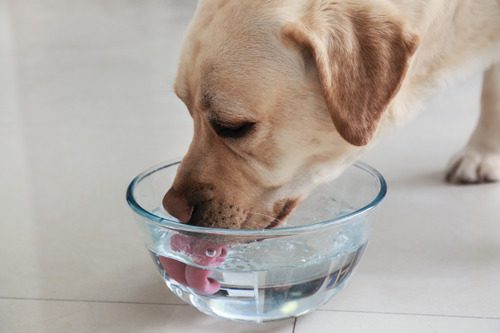Why is My Dog Drinking So Much Water?
If you’ve noticed your dog seems to be drinking more water than usual, it’s understandable to feel concerned. A change in thirst can be a sign of various conditions, some minor and some more serious. It’s essential to observe your dog and consider if there are any other changes in behavior or health. Increased thirst can be a reaction to warmer weather, increased activity, or it could be a sign of a health issue that requires attention from a veterinary professional.
At North Kenny Veterinary Hospital in Columbus, OH, we understand the bond between pets and their owners. If you’re worried about your dog’s health, call us at (614) 451-1204 or request an appointment online. Our team is here to support your pet’s health and well-being.

Possible Reasons for Increased Thirst
Changes in Diet or Environment
Sometimes, the explanation for your dog’s increased water consumption is as simple as a change in their diet or environment. For example, dogs eating dry food may drink more water than those on a wet food diet. Similarly, during the hot summer months or after more intense exercise, dogs will naturally need more water.
Medical Conditions
Increased thirst can also indicate several medical conditions, such as diabetes, kidney disease, or Cushing’s disease. These conditions can affect your dog’s ability to regulate hydration and may lead to increased water consumption as their body attempts to compensate.
Diabetes
In dogs with diabetes, the body either doesn’t produce enough insulin or can’t use it properly. This leads to higher levels of glucose in the blood, which can cause increased thirst as the body tries to flush out the excess glucose.
Kidney Disease
Kidney disease can make it harder for your dog’s body to conserve water, leading to increased thirst and urination. Early detection and treatment are vital to managing kidney disease and maintaining your dog’s quality of life.
Cushing’s Disease
Cushing’s disease is caused by an excess of cortisol in the body. One of the symptoms of this hormonal imbalance is increased thirst. If you notice your dog drinking more than usual, along with other signs like increased hunger or hair loss, it’s important to consult a veterinarian.
What You Can Do
Observing your dog and keeping track of any changes in behavior, including their water consumption, is crucial. While it’s important not to jump to conclusions, if you notice that your dog’s thirst has increased significantly and doesn’t seem to be related to their diet or activity level, it’s time to consult a professional. If you’re concerned about your dog’s increased water intake, give North Kenny Veterinary Hospital a call at (614) 451-1204 or request an appointment online. We’re here to help ensure your pet remains happy and healthy.
When to See a Veterinarian
If your dog’s thirst seems excessive or is accompanied by other symptoms such as changes in urination, weight loss, decreased appetite, or lethargy, it’s crucial to seek veterinary care. These signs can indicate underlying health issues that require professional diagnosis and treatment.
Preparing for Your Visit
When preparing for your visit to North Kenny Veterinary Hospital, it’s helpful to note any other changes in your dog’s behavior or health. This information can be valuable in diagnosing the cause of their increased thirst. Our team is ready to work with you to find the best course of action for your dog’s health.
While an increase in your dog’s water consumption can be due to simple factors like diet or temperature, it can also be a sign of more serious health issues. Monitoring your pet and seeking professional advice when necessary is key to ensuring their well-being. At North Kenny Veterinary Hospital, we’re dedicated to providing the care your pet needs. Don’t hesitate to reach out to us if you’re concerned about your dog’s health.
Recent Posts
About North Kenny Veterinary Hospital
North Kenny Veterinary Hospital has been serving Columbus, OH pet families with exceptional veterinary medicine since the 1950s. We put a strong emphasis on preventive medicine as well as low-stress handling to help pets have a more pleasant veterinary experience. We use Fear Free techniques for every cat and dog to help reduce their anxiety and calm their nerves.
